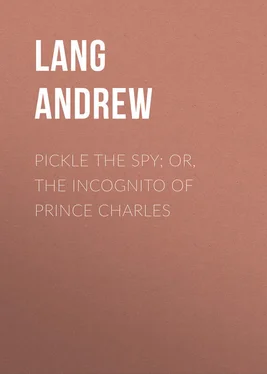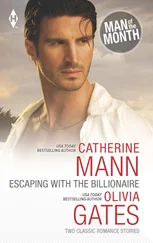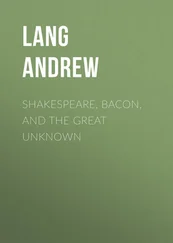Andrew Lang - Pickle the Spy; Or, the Incognito of Prince Charles
Здесь есть возможность читать онлайн «Andrew Lang - Pickle the Spy; Or, the Incognito of Prince Charles» — ознакомительный отрывок электронной книги совершенно бесплатно, а после прочтения отрывка купить полную версию. В некоторых случаях можно слушать аудио, скачать через торрент в формате fb2 и присутствует краткое содержание. Жанр: foreign_antique, foreign_prose, на английском языке. Описание произведения, (предисловие) а так же отзывы посетителей доступны на портале библиотеки ЛибКат.
- Название:Pickle the Spy; Or, the Incognito of Prince Charles
- Автор:
- Жанр:
- Год:неизвестен
- ISBN:нет данных
- Рейтинг книги:4 / 5. Голосов: 1
-
Избранное:Добавить в избранное
- Отзывы:
-
Ваша оценка:
- 80
- 1
- 2
- 3
- 4
- 5
Pickle the Spy; Or, the Incognito of Prince Charles: краткое содержание, описание и аннотация
Предлагаем к чтению аннотацию, описание, краткое содержание или предисловие (зависит от того, что написал сам автор книги «Pickle the Spy; Or, the Incognito of Prince Charles»). Если вы не нашли необходимую информацию о книге — напишите в комментариях, мы постараемся отыскать её.
Pickle the Spy; Or, the Incognito of Prince Charles — читать онлайн ознакомительный отрывок
Ниже представлен текст книги, разбитый по страницам. Система сохранения места последней прочитанной страницы, позволяет с удобством читать онлайн бесплатно книгу «Pickle the Spy; Or, the Incognito of Prince Charles», без необходимости каждый раз заново искать на чём Вы остановились. Поставьте закладку, и сможете в любой момент перейти на страницу, на которой закончили чтение.
Интервал:
Закладка:
Though it is certain that, in March 1749 (the only month when he almost evades us), Charles could not have visited Berlin, Livadia, Stockholm, the reader may care to be reminded of a contemporary Jacobite romance in which he is made to do all these things. A glance should be cast on the pamphlet called ‘A Letter from H. G – g, Esq.’ (London, 1750). The editor announces that the letter has been left in his lodgings by a mistake; it has not been claimed, as the person for whom it was meant has gone abroad, and so the editor feels free to gratify ‘the curiosity of the town.’ The piece, in truth, is a Jacobite tract, meant to keep up the spirits of the faithful, and it is probable that the author really had some information, though he is often either mistaken, or fables by way of a ‘blind.’ About February 11, says the scribe (nominally Henry Goring, Charles’s equerry, an ex-officer of the Queen of Hungary), a mysterious stranger, the ‘Chevalier de la Luze,’ came to Avignon, and was received by the Prince ‘with extraordinary marks of distinction.’ ‘He understood not one word of English,’ which destroys, if true, the theory that the Earl Marischal, or Marshal Keith, is intended. French and Italian he spoke well, but with a foreign accent. Kelly ventured to question the Prince about the stranger, but was rebuffed. One day, probably February 24, the stranger received despatches, and vanished as he had come. The Prince gave a supper (d’Argenson’s ‘ball’), and, when his guests had retired, summoned Goring into his study. He told Goring that ‘there were spies about him’ (the Earl Marischal, we know, distrusted Kelly); he rallied him on a love-affair, and said that Goring only should be his confidant. Next morning, very early, they two started for Lyons, disguised as French officers. As far as Lyons, indeed, the French police actually traced them. 51 51 D’Argenson, v. 417. March 19, 1749. D’Argenson knew more than the police.
But, according to the pamphlet, they did not stop in Lyons; they rested at a small town two leagues further on, whence the Prince sent dispatches to Kelly at Avignon. Engaging a new valet, Charles pushed to Strasbourg, where he again met La Luze, now described as ‘a person whose extraordinary talents had gained him the confidence one of the wisest Princes in Europe,’ obviously pointing to Frederick of Prussia, the master of Marshal Keith, and the friend and host of his brother, the Earl Marischal. At Strasbourg, Charles rescued a pretty young lady from a fire; she lost her heart at once to the ‘Comte d’Espoir’ (his travelling title), but the Prince behaved like Scipio, not to mention a patriarch famous for his continence. ‘I am no stoic,’ said His Royal Highness to La Luze, ‘but I have always been taught that pleasures, how pardonable soever in themselves, become highly criminal when indulged to the prejudice of another,’ adding many other noble and unimpeachable sentiments.
After a romantic adventure with English or Scottish assassins, in which His Royal Highness shot a few of them, the travellers arrived at Leipzig. La Luze now assumed his real name, and carried Charles, by cross roads, to ‘a certain Court,’ where he spent ten days with much satisfaction. He stayed at the house of La Luze (Berlin and the Earl Marischal appear to be hinted at, but the Marischal told Pickle that he had never seen Charles at Berlin), secret business was done, and then, through territories friendly or hostile, ‘a certain port’ was reached. They sailed (from Dantzig?), were driven into a hostile port (Riga?), escaped and made another port (Stockholm?) where they met Lochgarry, ‘whom the Prince thought had been one of those that fell at Culloden.’
This is nonsense. Lochgarry had been with Charles after Culloden, and had proposed to waylay Cumberland, which the Prince forbade. Murray of Broughton, in his examination, and Bishop Forbes agree on this point, and James, we know, sent, by Edgar, a message to Lochgarry on Christmas Eve, 1748. 52 52 Stuart Papers. Browne, iv. p. 51.
Charles, therefore, knew excellently well that Lochgarry did not die at Culloden. After royal, but very secret entertainment ‘in this kingdom’ (Sweden?), Charles went into Lithuania, where old friends of his maternal ancestors, the Sobieskis, welcomed him. He resumed a gaiety which he had lost ever since his arrest at the opera in Paris, and had ‘an interview with a most illustrious and firm friend to his person and interest.’ Though his marriage, says the pamphleteer, had been much talked of, ‘he has always declined making any applications of that nature himself. It was his fixed determination to beget no royal beggars.’ D’Argenson reports Charles’s remark that he will never marry till the Restoration, and, no doubt, he was occasionally this mood, among others. 53 53 Mémoires , v. 417.
The pamphleteer vows that the Prince ‘loves and is loved,’ but will not marry ‘till his affairs take a more favourable turn.’ The lady is ‘of consummate beauty, yet is that beauty the least of her perfections.’
The pamphlet concludes with vague enigmatic hopes and promises, and certainly leaves its readers little wiser than they were before. In the opinion of the Messrs. ‘Sobieski Stuart’ (who called themselves his grandsons), Charles really did visit Sweden, and his jewel, as Grand Master of the Grand Masonic Lodge of Stockholm, is still preserved there. 54 54 Tales of the Century , ii. 48, ‘from information of Sir Ralph Hamilton.’
The castle where he resided in Lithuania, it is said, is that of Radzivil. 55 55 ‘Information by Baron de Rondeau and Sir Ralph Hamilton.’
The affectionate and beautiful lady is the Princess Radzivil, to whom the newspapers were busy marrying Charles at this time. The authors of ‘Tales of the Century,’ relying on some vague Polish traditions, think that a party was being made to raise the Prince to the Polish crown. In fact, there is not a word of truth in ‘Henry Goring’s letter.’
We now study the perplexities of Courts and diplomatists. Pickle was not yet at hand with accurate intelligence, and, even after he began to be employed, the English Government left their agents abroad to send in baffled surmises. From Paris, on March 8, Colonel Joseph Yorke (whom d’Argenson calls by many ill names) wrote, ‘I am told for certain that he [the Prince] is now returned to Avignon.’ 56 56 S. P. France. No. 442.
Mann, in Florence, hears (March 7) that the Prince has sent a Mr. Lockhart to James to ask for money, but that was really done on December 31, 1748. 57 57 S. P. Tuscany. No. 58. Stuart Papers. Browne, iv. 52.
On March 11, Yorke learned from Puysieux that the Prince had been recognised by postboys as he drove through Lyons towards Metz; probably, Puysieux thought, on ‘an affair of gallantry.’ Others, says Yorke, ‘have sent him to Poland or Sweden,’ which, even in 1746, had been getting ready troops to assist Charles in Scotland. 58 58 S. P. France. No. 442.
On March 20, Yorke hints that Charles may be in or near Paris, as he probably was. Berlin was suggested as his destination by Horace Mann (April 4). Again, he has been seen in disguise, walking into a gate of Paris (April 11). 59 59 This may have been true.
On April 14, Walton, from Florence, writes that James has had news of his son, is much excited, and is sending Fitzmorris to join him. The Pope knows and is sure to blab. 60 60 S. P. Tuscany. No. 55.
On May 3, Yorke mentions a rumour, often revived, that the Prince is dead. On May 9, the Jacobites in Paris show a letter from Oxford inviting Charles to the opening of the Radcliffe, ‘where they assure him of better reception than the University has had at Court lately.’ 61 61 Dr. King made a Latin speech on this occasion, rich in Jacobite innuendoes. Redeat was often repeated.
Mann (May 2) mentions the Radzivil marriage, arranged, in a self-denying way, by the Princesse de Talmond. On May 17, Yorke hears from Puysieux that the French ambassador in Saxony avers that Charles is in Poland, and that Sir Charles Williams has remonstrated with Count Brühl. On May 1, 1749, Sir Charles Hanbury Williams wrote from Leipzig to the Duke of Newcastle. He suspects that Charles is one of several persons who have just passed through Leipzig on the way to Poland; Count Brühl is ‘almost certain’ of it. 62 62 S. P. Poland. No. 75.
On May 5 (when Charles was really in or near Venice), Hanbury Williams sends a copy of his remonstrance with Brühl.
Интервал:
Закладка:
Похожие книги на «Pickle the Spy; Or, the Incognito of Prince Charles»
Представляем Вашему вниманию похожие книги на «Pickle the Spy; Or, the Incognito of Prince Charles» списком для выбора. Мы отобрали схожую по названию и смыслу литературу в надежде предоставить читателям больше вариантов отыскать новые, интересные, ещё непрочитанные произведения.
Обсуждение, отзывы о книге «Pickle the Spy; Or, the Incognito of Prince Charles» и просто собственные мнения читателей. Оставьте ваши комментарии, напишите, что Вы думаете о произведении, его смысле или главных героях. Укажите что конкретно понравилось, а что нет, и почему Вы так считаете.












